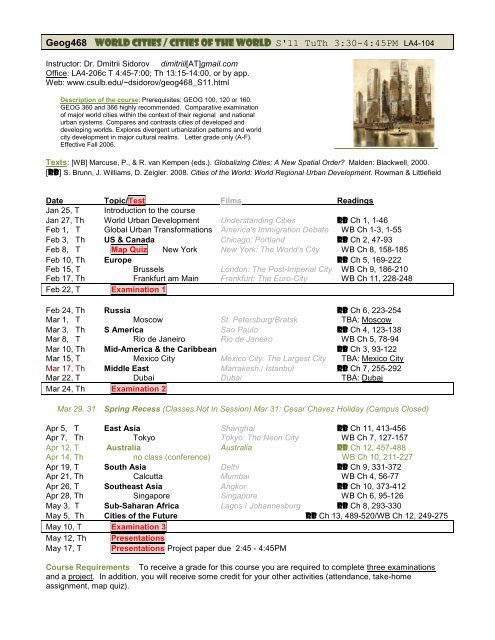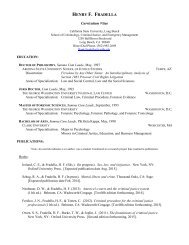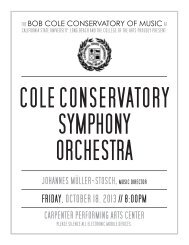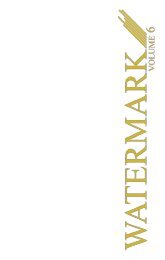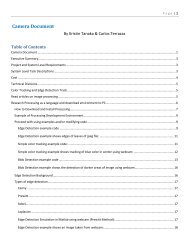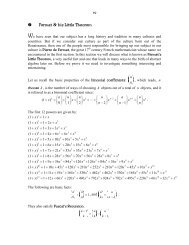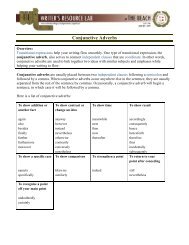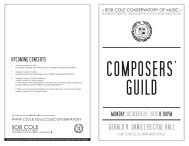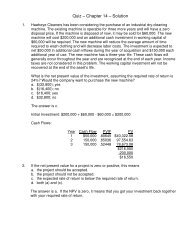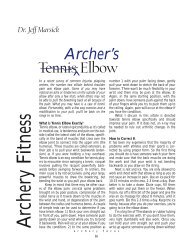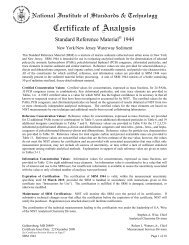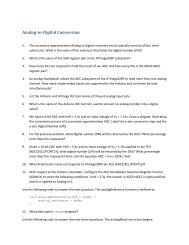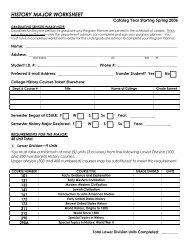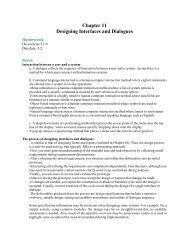Syllabus
Syllabus
Syllabus
You also want an ePaper? Increase the reach of your titles
YUMPU automatically turns print PDFs into web optimized ePapers that Google loves.
Geog468 World Cities / Cities of the World S'11 TuTh 3:30-4:45PM LA4-104<br />
Instructor: Dr. Dmitrii Sidorov dimitriii[AT]gmail.com<br />
Office: LA4-206c T 4:45-7:00; Th 13:15-14:00, or by app.<br />
Web: www.csulb.edu/~dsidorov/geog468_S11.html<br />
Description of the course: Prerequisites: GEOG 100, 120 or 160.<br />
GEOG 360 and 366 highly recommended. Comparative examination<br />
of major world cities within the context of their regional and national<br />
urban systems. Compares and contrasts cities of developed and<br />
developing worlds. Explores divergent urbanization patterns and world<br />
city development in major cultural realms. Letter grade only (A-F).<br />
Effective Fall 2006.<br />
Texts: [WB] Marcuse, P., & R. van Kempen (eds.). Globalizing Cities: A New Spatial Order? Malden: Blackwell, 2000.<br />
[RB] S. Brunn, J. Williams, D. Zeigler. 2008. Cities of the World: World Regional Urban Development. Rowman & Littlefield<br />
Date Topic/Test Films Readings<br />
Jan 25, T Introduction to the course<br />
Jan 27, Th World Urban Development Understanding Cities RB Ch 1, 1-46<br />
Feb 1, T Global Urban Transformations America's Immigration Debate WB Ch 1-3, 1-55<br />
Feb 3, Th US & Canada Chicago; Portland RB Ch 2, 47-93<br />
Feb 8, T Map Quiz New York New York: The World’s City WB Ch 8, 158-185<br />
Feb 10, Th Europe RB Ch 5, 169-222<br />
Feb 15, T Brussels London: The Post-Imperial City WB Ch 9, 186-210<br />
Feb 17, Th Frankfurt am Main Frankfurt: The Euro-City WB Ch 11, 228-248<br />
Feb 22, T Examination 1<br />
Feb 24, Th Russia RB Ch 6, 223-254<br />
Mar 1, T Moscow St. Petersburg/Bratsk TBA: Moscow<br />
Mar 3, Th S America Sao Paulo RB Ch 4, 123-138<br />
Mar 8, T Rio de Janeiro Rio de Janeiro WB Ch 5, 78-94<br />
Mar 10, Th Mid-America & the Caribbean RB Ch 3, 93-122<br />
Mar 15, T Mexico City Mexico City: The Largest City TBA: Mexico City<br />
Mar 17, Th Middle East Marrakesh / Istanbul RB Ch 7, 255-292<br />
Mar 22, T Dubai Dubai TBA: Dubai<br />
Mar 24, Th Examination 2<br />
Mar 29, 31<br />
Spring Recess (Classes Not In Session) Mar 31: Cesar Chavez Holiday (Campus Closed)<br />
Apr 5, T East Asia Shanghai RB Ch 11, 413-456<br />
Apr 7, Th Tokyo Tokyo: The Neon City WB Ch 7, 127-157<br />
Apr 12, T Australia Australia RB Ch 12, 457-488<br />
Apr 14, Th no class (conference) WB Ch 10, 211-227<br />
Apr 19, T South Asia Delhi RB Ch 9, 331-372<br />
Apr 21, Th Calcutta Mumbai WB Ch 4, 56-77<br />
Apr 26, T Southeast Asia Angkor RB Ch 10, 373-412<br />
Apr 28, Th Singapore Singapore WB Ch 6, 95-126<br />
May 3, T Sub-Saharan Africa Lagos / Johannesburg RB Ch 8, 293-330<br />
May 5, Th Cities of the Future RB Ch 13, 489-520/WB Ch 12, 249-275<br />
May 10, T Examination 3<br />
May 12, Th Presentations<br />
May 17, T Presentations Project paper due 2:45 - 4:45PM<br />
Course Requirements To receive a grade for this course you are required to complete three examinations<br />
and a project. In addition, you will receive some credit for your other activities (attendance, take-home<br />
assignment, map quiz).
Examinations consist of True-False/Multiple Choice (70%) and short answer (30%) types of questions on<br />
lecture/textbook material. We don’t have a comprehensive final test: Test 3 covers only the material of the last<br />
segment of the course (after Test 2).<br />
Map quiz (30 points) checks knowledge of place locations (relevant materials for the map quiz will be provided<br />
in advance).<br />
Take-Home Assignment (10 points) and deadline will be discussed in class.<br />
Project (50 points) includes an in-class presentation (20 points) and a final paper (30 points) on contemporary<br />
transformations in a selected city from a region underrepresented in our readings.<br />
Attendance This is a video-intensive course; we will watch a number of films. At least for that reason<br />
attendance of all classes is required. Furthermore, the course will be much more interesting if you actively<br />
participate in class. For each attended class 2 points will be added.<br />
Grading The max number of points possible in the course is ~450. They will be distributed in the following way:<br />
Attendance 30x2=60 Assignment 10 Map Quiz 30 Project 50 Exams 97x3=291<br />
Final grade: A – above 90% of the best final score in class, B – 80-89.9%, C – 70-79.9%; D – 60-69.9%; F – < 60%.<br />
Grades will be posted on the course web-site using as identifiers the last four digits of students’ ID numbers. If<br />
you object to using portion of your ID for that purpose, provide the instructor with an alternative number ASAP.<br />
Makeup Policy Makeups for the tests/map quiz/project deadlines are possible ONLY in the event of a<br />
documented unexpected emergency (such as health problem) or through prior arrangement with the instructor<br />
when the student has advance knowledge of a compelling conflict in schedule. Makeups under these two<br />
circumstances will not be penalized. All other makeup requests are subject to denial or serious penalty (at least<br />
10 points for each postponed day).<br />
Email Correspondence The instructor will contact by email the class as a whole using the list of email<br />
addresses of students registered for the course. It is the student’s responsibility to keep email address in the<br />
system updated: just visit my.csulb.edu to make changes. Be professional in your email correspondence,<br />
address the instructor either formally as Dr. Sidorov or informally as Dmitrii, and always sign your emails<br />
providing your full name and the course number you are referring to.<br />
Withdrawal Policy It is the student's responsibility to withdraw from classes. Instructors have no obligation to<br />
withdraw students who do not attend classes and may choose not to do so. Follow the university’s policy.<br />
SCHOLASTIC CONDUCT As a student at Cal State University, you are part of an academic community and<br />
expected to behave in a manner that is respectful of that community, by not engaging in academic misconduct.<br />
Academic misconduct is an act in which a student:<br />
a) seeks to claim credit for the work or efforts of another without authorization or citation; b) uses<br />
unauthorized materials or fabricated data in any academic exercise; c) forges or falsifies academic documents<br />
or records; d) intentionally impedes or damages the academic work of others; e) engages in conduct aimed at<br />
making false representation of a student's academic performance; f) assists other students in any of these acts.<br />
Examples of academic misconduct include, but are not limited to:<br />
• cheating on an examination;<br />
• collaborating with others in work to be presented, contrary to the stated rules of the course;<br />
• submitting a paper or assignment as one's own work when a part or all of the paper or assignment is the<br />
work of another;<br />
• submitting a paper or assignment that contains ideas or research of others without appropriately identifying<br />
the sources of those ideas;<br />
• stealing examination or course materials;<br />
• submitting, if contrary to the rules of a course, work previously presented in another course;<br />
• tampering with the laboratory experiment or computer program of another student;<br />
• knowingly and intentionally assisting another student in any of the above, including assistance in an<br />
arrangement whereby any work, classroom performance, examination or other activity is submitted or performed<br />
by a person other than the student under whose name the work is submitted or performed.


